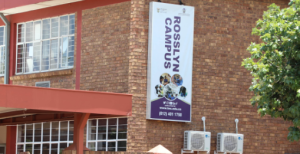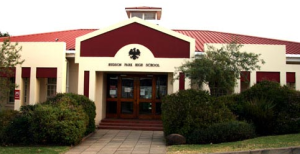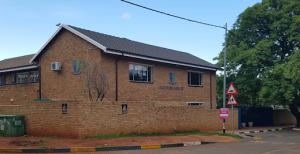The Essentials
Type of Institution: University
Fees per Semester: R10 000 – R60 000
Address: PO Box 77000, Nelson Mandela University, Gqeberha, 6031, South Africa
Phone Number: +27 (0) 41 504 1111
Chancellor: Geraldine Fraser-Moleketi
Vice Chancellor: Sibongile Muthwa
Number of students: 25 000+
Website: https://www.mandela.ac.za/
Email: info@mandela.ac.za
Table Of Contents
- Overview
- Contact Details
- Address
- Location
- School Fees
- Courses & Programs
- Vacancies and Entry Requirements
- Logo
- Notable Alumni
- Pros and Cons
- Author’s Review
Overview
Nelson Mandela University (NMU), formerly known as Nelson Mandela Metropolitan University, is a dynamic South African institution of higher learning.
Established in 2005 through the merger of the University of Port Elizabeth, Port Elizabeth Technikon, and Vista University’s Port Elizabeth campus, NMU embodies a vision of excellence, diversity, and transformation. Named after the global icon Nelson Mandela, the university is committed to social justice, community engagement, and academic excellence.
Vision and Mission
NMU’s vision is to be a dynamic African university recognized for its leadership in generating cutting-edge knowledge for a sustainable future. Its mission is to offer a diverse range of high-quality educational opportunities, focusing on the engagement between knowledge, people, and communities to address global challenges.
Student Life
NMU is known for offering a vibrant student life with various opportunities for personal growth, cultural activities, and sports. Key aspects include:
Sports: NMU has a strong focus on sports, with top-level facilities for rugby, cricket, soccer, athletics, and more. NMU’s rugby team, the Madibaz, competes in national university rugby competitions.
Student Societies: There are numerous student societies and clubs that cater to diverse interests, including academic, cultural, and recreational activities. These groups provide platforms for leadership development and social interaction.
Accommodation: NMU offers on-campus residences with various housing options, as well as support services for students looking for off-campus housing. The university ensures safe, affordable, and convenient living spaces for its students.
Student Support Services: NMU provides a wide range of support services, including academic advising, career counseling, psychological services, and financial aid support. The university aims to help students succeed academically and personally.
Location and Campuses
NMU has seven campuses spread across two cities, namely Port Elizabeth (now known as Gqeberha) and George:
South Campus: Main campus located in Summerstrand, Gqeberha.
North Campus: A hub for engineering and IT faculties.
Second Avenue Campus: Home to business and economic sciences programs.
Missionvale Campus: Focuses on health sciences and education.
Bird Street Campus: Known for arts and culture programs.
Ocean Sciences Campus: Dedicated to oceanography and marine studies.
George Campus: Located in the Western Cape, specializing in forestry, agriculture, and nature conservation.
Research and Innovation
Nelson Mandela University is committed to research that contributes to socio-economic development, environmental sustainability, and technological innovation. Key research areas include:
Ocean and Marine Sciences
Renewable Energy
Sustainable Development
Health and Wellness
Education Transformation
Law and Social Justice
The university also collaborates with international institutions and industry partners, fostering global research partnerships and promoting knowledge transfer.
Diversity and Inclusivity
As an institution named after Nelson Mandela, NMU is committed to promoting transformation, diversity, and social justice. The university has a strong focus on inclusivity, ensuring that students from all racial, cultural, and socioeconomic backgrounds feel welcome and supported. Programs and policies at NMU encourage equal access to education, gender equality, and social equity.
Community Engagement
Nelson Mandela University is actively involved in community engagement projects that address social, economic, and environmental challenges.
The university collaborates with local communities, NGOs, and government bodies to foster social change, provide educational support, and improve public health. NMU is committed to contributing to the development of the region and the country at large through these initiatives.
International Collaborations
Nelson Mandela University has strong ties with international universities, creating opportunities for students and staff to participate in exchange programs and global research initiatives. These partnerships enhance the university’s reputation as a globally connected institution.
Nelson Mandela University Contact Details
You can contact Nelson Mandela University via their landline, email or you can visit their website for further contact details.
Phone Number: +27 (0) 41 504 1111
Website: https://www.mandela.ac.za/
Email: info@mandela.ac.za
Nelson Mandela University Address
PO Box 77000, Nelson Mandela University, Gqeberha, 6031, South Africa
Nelson Mandela University Location
Nelson Mandela University has several campuses across South Africa. Their main campus (South Campus) is located in the capturing suburb of Summerstand in the city of Gqeberha.
Nelson Mandela University Fees
Nelson Mandela University’s fees is currently standing at R10 000 – R75 000 per year depending on the program you are studying and the level of degree you are studying. Please contact the institution or visit them to get the latest fees structure as it can change at any year or semester.
Nelson Mandela University Courses & Programs
Nelson Mandela University (NMU) offers a wide range of undergraduate and postgraduate programs across its various faculties.
Faculty of Arts
Undergraduate Programs:
BA in Media, Communication, and Culture
BA in Psychology
BA in Sociology
BA in History
BA in Philosophy
BA in Language Studies
BA in Journalism
BA in Visual Arts
BA in Performing Arts (Music, Drama)
Postgraduate Programs:
Honours in Media Studies, Psychology, Sociology, Philosophy, and Visual Arts
Master’s in Journalism, Media Studies, and Fine Arts
PhD in Humanities and Social Sciences
Faculty of Business and Economic Sciences
Undergraduate Programs:
BCom in General Business Management
BCom in Accounting
BCom in Economics
BCom in Financial Planning
BCom in Marketing
BCom in Human Resource Management
Bachelor of Business Administration (BBA)
Diploma in Accountancy
Postgraduate Programs:
Postgraduate Diploma in Financial Planning
Honours in Accounting, Economics, Business Management
Master’s in Business Administration (MBA)
MCom in Accounting, Economics, and Business Management
PhD in Business and Economic Sciences
Faculty of Education
Undergraduate Programs:
BEd in Foundation Phase Teaching
BEd in Intermediate Phase Teaching
BEd in Senior and FET Phase Teaching (specializations in Mathematics, Science, and Languages)
Postgraduate Programs:
Postgraduate Certificate in Education (PGCE)
Honours in Education (Curriculum Studies, Educational Leadership)
Master’s in Education (MEd)
PhD in Education
Faculty of Engineering, the Built Environment, and Technology
Undergraduate Programs:
BEng in Mechanical Engineering
BEng in Electrical Engineering
BEng in Civil Engineering
BEng in Mechatronics
BSc in Construction Management
BSc in Information Technology
Diploma in Engineering Technology (Mechanical, Electrical, Civil)
Postgraduate Programs:
Honours in Engineering
Master’s in Engineering (MEng)
PhD in Engineering and the Built Environment
Faculty of Health Sciences
Undergraduate Programs:
MBChB (Bachelor of Medicine and Bachelor of Surgery)
Bachelor of Nursing
Bachelor of Environmental Health
Bachelor of Radiography
BSc in Human Movement Science
BSc in Dietetics
Postgraduate Programs:
Honours in Nursing, Radiography, and Human Movement Science
Master’s in Medicine (MMed) (various specializations)
Master’s in Public Health
PhD in Health Sciences
Faculty of Law
Undergraduate Programs:
LLB (Bachelor of Laws)
BA Law
BCom Law
Postgraduate Programs:
Postgraduate Diploma in Labour Law
Postgraduate Diploma in Financial Planning Law
LLM in Constitutional Law, Labour Law, and Environmental Law
PhD in Law
Faculty of Science
Undergraduate Programs:
BSc in Biological Sciences
BSc in Chemistry
BSc in Environmental Science
BSc in Physics
BSc in Mathematics and Applied Mathematics
BSc in Computer Science
BSc in Geosciences
BSc in Oceanography
Postgraduate Programs:
Honours in Chemistry, Physics, Mathematics, Environmental Science, and Computer Science
Master’s in Chemistry, Physics, and Oceanography
PhD in Science and Technology
Faculty of Humanities
Undergraduate Programs:
BA in Development Studies
BA in Social Work
BA in Anthropology
BA in Politics
BA in Sociology
Postgraduate Programs:
Honours in Social Work, Anthropology, and Development Studies
Master’s in Social Work
PhD in Social Sciences
Faculty of Natural Resource Management (George Campus)
Undergraduate Programs:
BSc in Forestry
BSc in Agriculture
BSc in Nature Conservation
Diploma in Agricultural Management
Diploma in Forestry
Diploma in Nature Conservation
Postgraduate Programs:
Honours in Forestry, Nature Conservation, and Agriculture
Master’s in Forestry and Agriculture
PhD in Natural Resource Management
Ocean Sciences Faculty (Ocean Sciences Campus)
Undergraduate Programs:
BSc in Oceanography
BSc in Marine Biology
BSc in Coastal Engineering
Postgraduate Programs:
Honours in Marine Studies and Oceanography
Master’s and PhD in Ocean Sciences
Nelson Mandela University Vacancies and Entry Requirements
Entry Requirements
The entry requirements at Nelson Mandela University vary depending on the level of study (undergraduate or postgraduate) and the specific program of interest.
Undergraduate Entry Requirements
General Requirements:
National Senior Certificate (NSC): Prospective students must hold a valid NSC or equivalent with a Bachelor’s pass.
Admission Point Score (APS): Applicants must meet the minimum APS, which varies depending on the chosen program. APS is calculated from the final high school results, typically ranging from 28 to 40.
English Proficiency: A minimum achievement level of 4 (50%) in English.
Mathematics and Science: Certain programs, particularly those in the faculties of Science, Engineering, and Health, require specific minimum levels in subjects like Mathematics, Physical Science, and Life Sciences.
Faculty-Specific Requirements:
Faculty of Health Sciences: MBChB (Medicine): Minimum APS of 38, with strong performance in Mathematics (level 6), Physical Science (level 6), and Life Sciences (level 6).
Faculty of Business and Economic Sciences: BCom Accounting: APS of 32 or more, with Mathematics (level 4 or higher).
Faculty of Engineering and Built Environment: BEng Programs: APS of 36 or higher, with Mathematics (level 6) and Physical Science (level 6).
Extended Curriculum Programs:
NMU offers Extended Curriculum Programs (ECP) for students who do not meet the standard entry requirements but show potential. These programs include additional academic support to help students succeed.
Postgraduate Entry Requirements
Honours Programs:
Bachelor’s Degree: Applicants must have a relevant undergraduate degree, usually with an average mark of 60%–65% in the major subject.
Additional Requirements: Some programs may require an interview, portfolio submission (for arts-related fields), or specific work experience.
Master’s Programs:
Honours Degree or Equivalent: A relevant honours degree or four-year equivalent qualification.
Research Proposal: For research-based master’s degrees, a proposal must be submitted outlining the intended study.
Work Experience: For professional programs like an MBA, a minimum of three years of relevant work experience is often required.
Doctoral (PhD) Programs:
Master’s Degree: A relevant master’s degree is required.
Research Proposal: Applicants must submit a detailed research proposal for approval.
Supervisor Availability: Students need to secure a supervisor whose expertise aligns with their research focus before admission.
International Students:
Qualification Assessment: International students must have their qualifications evaluated by the South African Qualifications Authority (SAQA).
Language Proficiency: Non-native English speakers must provide proof of English language proficiency (e.g., TOEFL or IELTS).
Visa and Study Permits: International students must hold a valid study visa.
Application Process
Online Application: All applications are submitted online through the NMU application portal.
Upload the necessary documents, including school transcripts, proof of payment for the application fee, and identification documents.
Application Deadlines:
Undergraduate programs: Application deadlines usually fall in September for the following year.
Postgraduate programs: Application deadlines vary by program, with most research programs having flexible intakes.
Nelson Mandela University Logo
Below is the logo of Nelson Mandela University with excellent quality and it is available to download in PNG (transparent file) JPEG and PDF.
Nelson Mandela University Logo
Nelson Mandela University Notable Alumni
Amanda Black – South African singer-songwriter
Samela Tyelbooi – Actress
Laduma Ngxokolo – Fashion Designer (Maxhosa)
Andile Dyalvane(Rasta) – Artist
Wayne Parnell – South African cricketer
Tyler Paul – South African rugby union player
Lusanda Badiyana – Rugby union player
Chris Hollis – South African rugby union player
Junior Pokomela – South African rugby union player
Pamela Mtanga – TV show host
Nelson Mandela University Pros and Cons
Pros
Diverse Range of Programs: NMU offers a wide variety of undergraduate and postgraduate programs across multiple faculties such as Arts, Business, Engineering, Health Sciences, Law, and Ocean Sciences. This gives students a lot of flexibility in choosing courses that fit their interests and career goals.
Commitment to Social Justice and Inclusivity: NMU is named after Nelson Mandela, a global icon for social justice and equality. The university emphasizes diversity, inclusivity, and transformation, fostering a welcoming environment for students from all backgrounds.
Strong Focus on Research and Innovation: NMU is a research-driven institution, with significant emphasis on sustainability, ocean sciences, and renewable energy. It encourages students to be part of cutting-edge research that addresses real-world issues.
Ocean Sciences Campus: NMU is the only university in South Africa with a dedicated Ocean Sciences Campus, specializing in marine studies, oceanography, and coastal management. This campus reflects NMU’s leadership in marine research and ocean sustainability.
Location and Campus Life: Located in Gqeberha (Port Elizabeth) and George, NMU offers beautiful campuses close to the coast, which provides a relaxed, scenic environment for students. The main Summerstrand campus is particularly noted for its proximity to the ocean. The university has a vibrant student life, with many sports, cultural, and recreational activities.
Focus on Sustainability: NMU has a strong focus on environmental sustainability. This is reflected in its curricula, research, and campus development, which include green initiatives and environmental stewardship.
Affordable Fees: NMU is known for offering high-quality education at relatively affordable tuition fees compared to many other South African universities. There are also numerous scholarships and financial aid options available.
Community Engagement: The university is deeply involved in local and regional community projects, allowing students to participate in community service and gain practical experience in addressing societal issues.
Cons
Limited International Recognition: Although NMU is highly respected in South Africa and Africa, it may not have the same level of international recognition as older, more established universities like the University of Cape Town or Wits University. This could affect students looking to work or study internationally.
Funding for Research: While NMU is committed to research and innovation, it may not have the same level of research funding and resources as larger universities. Some students and faculty may find limited funding options for large-scale or highly specialized research projects.
Limited Program Specializations: Although NMU offers a wide range of programs, some specialized fields (e.g., advanced technology or certain niche engineering programs) may not be as developed as those at other universities with larger or more focused departments.
Regional Location: NMU is situated in Gqeberha (Port Elizabeth), which, while offering a pleasant environment, may not have the same level of industry connections or networking opportunities as major cities like Johannesburg or Cape Town. This could impact internship and job placement opportunities in certain industries.
Administrative Delays: Some students have reported delays in administrative processes such as registration, processing of results, or accessing financial aid. Bureaucratic inefficiencies can cause frustration during certain stages of a student’s academic journey.
Limited Residence Space: While NMU offers on-campus accommodation, the demand for student housing often exceeds availability. Many students have to look for off-campus housing, which may not be as convenient or affordable, particularly for first-year students.
Growing Pains: As NMU continues to expand and develop, some faculties and departments might still be in transition or developing infrastructure, which can affect the delivery of certain courses or services.
Author's Review
Nelson Mandela University (NMU) stands out as a dynamic and forward-thinking institution, committed to providing quality education and fostering social justice. Named in honor of the iconic leader Nelson Mandela, the university embodies a strong ethos of inclusivity, sustainability, and community engagement.
Its diverse range of academic programs across multiple faculties, including its unique focus on ocean sciences, reflects its dedication to addressing contemporary global challenges and nurturing future leaders.
The university’s picturesque campuses in Gqeberha (Port Elizabeth) and George offer students a vibrant and supportive environment, enriched by a strong commitment to research, innovation, and practical community involvement.
NMU’s affordable tuition fees, extended curriculum programs, and extensive support services further enhance its appeal to students seeking a comprehensive and accessible higher education experience.
However, prospective students should consider some of the institution’s limitations, such as its relatively lower international recognition compared to older universities, potential administrative delays, and the challenges associated with limited on-campus accommodation. While NMU is continually evolving and expanding, these factors may influence the overall experience for some students.
In summary, Nelson Mandela University is a commendable choice for students seeking a university that emphasizes academic excellence, social responsibility, and environmental sustainability. Its unique strengths, including its innovative ocean sciences campus and strong community focus, make it a noteworthy option for those looking to make a meaningful impact through their education.



